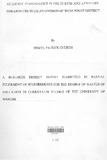| dc.description.abstract | The main purpose of this study was to determine the students' attitude towards Christian Religious Education, a crucial subject in any school system. This research sought to explore the influence of Christian Religious Education teachers' attitude to learning and teaching of the subject. It was further meant to identify conditions that hinder good performance and those factors that enhance performance. In this regard, the researcher endeavoured to establish indicators of positive attitudes towards Christian Religious Education and identify strategies that could be instituted to undo the negative factors that do not promote effective learning, teaching and assessment of the subject. The research was to determine whether lack of updated teaching and learning resources has an influence on students' achievement and performance m
Christian Religious Education.
In conducting literature review, the following subheadings were adopted. First, there was literature that dealt with the objectives of Secondary Education and those of teaching both Christian Religious Education andl Ethics. Second, literature related to teachers, students, school and home characteristics were reviewed in relation to study objectives and variables. This study used a questionnaire instrument, which consisted of two major parts. The first part elicited information on the sample population in terms of performance in KCSE and background details of respondents while the second dealt with attitudes.
The study adopted an ex-post-facto design. The sample population for a pilot study consisted of 30 students, one Christian Religious Education teacher and one head teacher. The Pearson's Moment Correlation Coefficient and Spearman's Brown test for internal reliability
was used to determine internal instrument reliability.
Following piloting results, research instruments were modified .. There were 200 student
respondents, 2 teachers ofCRE and 2 head teachers making up 72% of the target population.
Data obtained was organized and analyzed using descriptive statistics, means, percentages
and frequency tables. The hypotheses were tested using the Chi-Square, a non-parametric
test. The attitudinal scales weighted means were calculated after assigning arbitrary scores to
the responses as follows: strongly agree to strongly disagree continuum was scored a range
of 5-1 for the positively stated items respectively, while the reverse of scores were scored on the items of the attitudinal scale which were negatively stated. The frequencies obtained were used to compute hypotheses testing using the Chi-Square test of independence between variables of this study.
The findings of the study showed that students' performance in Christian Religious
Education in the Kenya Certificate of Secondary Education was affected by a series of
conditions and factors that existed in the school and home environments. It was also noted that performance in the subject was influenced by the introduction and teaching of Social
Education and Ethics, student-teacher relationship, laziness by learners, inadequate updated resources, limited parental involvement in education and non-involvement of teachers in
marking KCSE examinations in their subject area.
6 these findings, the researcher put forward recommendations outlined be'irsi.,
that seminars or in-service courses be planned by the Ministry of Education for Christian
Religiou . Education teachers in order to improve their attitude to the subject.
Second, parents through Parents Teachers Associations should endeavour to set up day
schools alongside boarding schools in order to provide affordable education to children
whose parents could not afford paying boarding school fees, and hence reduce the problems of absenteeism due to lack of fees.
Furthermore, the Kenya National Examination Council needs to decentralize the setting and marking of examinations in order to involve more teachers in these services at both
provincial and district levels.
The continuous assessment tests such as the District Mocks should have a centrally prepared set of questions and an appropriate marking scheme and that the marking of this Mock be done by individual subject teachers. These measures will prevent time wastage on administration of the Mocks and increase time for syllabus coverage.
Christian Religious Education needs to be studied for examination purposes and spiritual
growth. In this regard, students should not be encouraged to choose between Christian
Religious Education and History or Geography, but rather to choose between Religious
Education subjects in the Curriculum.
Further to this, a research needs to be done in order to establish the effect of training as a
K.C.S.E. examiner with the Kenya National Examinations Council to teaching, assessment and performance of students in K.C.S.E. Another research could be done to establish the attitude of students to day schools as ?pposed to boarding schools with an effort to determine whether a boardin.g environment provides a favourable learning atrnosohere for most
mr, l-as less discipline related cases that impact negatively G performance in schools. | en |

